
|
Safe (1995)
In director Todd Haynes' provocative and compelling
medical drama, often interpreted as an AIDS allegory - a chilling,
bleak, disturbing and provocative tale of a modern-day, environmentally-induced
descent into madness; the film continually pondered the main ambiguous
issue - was the disturbed female protagonist psychologically impaired
or physically ill, or both?:
- the opening sequence (a ride into a gated community
filmed from a car seat) introduced the
home of sexually-unfulfilled, affluent, zombie-like, vacuous and
routinely-bored San Fernando Valley housewife Carol White (Julianne
Moore) in 1987 - she was a "total milk-a-holic" who lived
a life of complete pampering and luxury (without much responsibility
or achievement) in suburbia with her bland husband Greg White (Xander
Berkeley), a doctor; their first scene together was having sex
- from an overhead view
- in the aerobics class scene (exercising in a colorful
outfit with other females in a mirrored room to Madonna's "Lucky
Star"), Carol seemed isolated from the others,
and in the locker room, as others talked about "emotional maintenance"
and "stress management," she was complimented ("You
do not sweat!" - a statement about her easy life); her only
response was to smile broadly and not really socially engage; she
could barely respond with the words: "I know it's true"
|
Aerobics Class
|
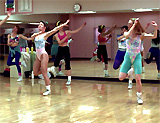
Mirrored Studio - Isolated
|
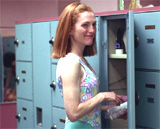
Locker Room: Carol Was Told: "You do not sweat!"
|
- the onset of some physical and emotional difficulties
began in the film with Carol's stressed annoyance at the delivery
of two black couches for her living room; when she demanded
a replacement, she claimed that she had ordered teal although
the original order was for black; she insisted she was right:
"That's impossible. It doesn't go with anything else we
have" [Note: Later in the film, Carol insisted the fabric
on the couches was toxic]
- while driving, Carol trailed
a truck in her car while listening to a talk-radio conversation
about subjects such as the "end of the world" and President Ronald
Reagan, she began to choke uncontrollably
on copious exhaust fumes exuded from the truck; her coughing
fit continued as she drove into a dark and claustrophobic underground
parking garage
- during lunch with her grieving friend Linda
(Susan Norman), Carol was advised to start a "fruit diet" (the
director's clear allusion to homosexuality, and the onset of
AIDS) to naturally cleanse the body of toxins; Carol was uncertain
and admitted: "I'm so run down lately," but began
by ordering a fruit salad
- Greg realized subtle changes in Carol and surmised
that she was stressed out, tired or "overexerted" - Carol
gradually became more and more detached and neurotic; but during
a visit to her physician Dr. Hubbard (Steven Gilborn), he diagnosed
nothing abnormal: "I really don't see anything wrong with you,
Carol. I mean, outside of a slight rash and some congestion.
I'll give you some ointment and some decongestant, but, uh,
I don't know what else to do"; her doctor suspected that her
new non-protein 'fruit diet' might be contributing to her ailments,
and also ordered her to stay away from dairy products (after
she said she was a milkaholic)
- at her hair-salon after having a permanent and
a manicure with her hairdresser (Janel Moloney), Carol began
to experience an unexpected nose-bleed
- after another visit to her doctor with her concerned
husband, Carol was told she was "perfectly healthy" - however,
he suggested that she had a "stress-related condition" that
could be treated by a psychiatrist
- it seemed that she was
afflicted with an incurable, psycho-somatic, debilitating allergy
or sensitivity to her threatening environment (various pollutants
including paint fumes, cleaning materials, dry cleaning residue,
car and truck exhaust, chemicals, poisons, deodorant, colognes,
hairspray, high-energy wires, the ozone, sunshine, additives-preservatives,
pesticides, etc.); she also suffered from stress about societal
concerns (LA gangs, an increase in murders, and encroachment
into the suburbs mentioned by her 10 year-old stepson Rory)
- after taking her regular aerobics class in her
health club, she approached a flyer asking: "Do
you smell FUMES?" - with further questions such as: "Are you allergic to the
20th century?", "Do you have trouble breathing?", "Is
your drinking water pure?", and "Do you suffer from
skin irritations?"; the flyer advertised a meeting to explain
about immunity disorders, known as 20th Century Disease
|
Carol's Phobia About the Environment
|
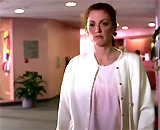
Carol in Health Club
|
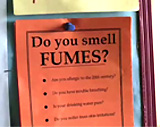
Flyer: "Do you smell FUMES?"
|
- with no relief from debilitating symptoms and allergic
reactions, Carol began to attend psychotherapy sessions with
a psychiatrist (John Apicella) who diagnosed that there were possibly
issues internal to Carol that he needed to learn about
- in the film's most
memorable and unsettling scene, Carol experienced severe breathing
difficulties at a baby shower for a pregnant friend
Barbara (Wendy Gayle) attended by a group of wealthy housewives
all wearing pastel dresses; as she sat by herself and watched the
opening of presents, she became increasingly distraught and gasped
for air while heavily wheezing
- Carol viewed a video infomercial (advertised
by the flyer) suggested that natural gas and car fumes
(and other chemical exposures) were causing a never-ending set
of ailments for many ordinary Americans, including headaches, fatigue,
blackouts, seizures, and depression; it suggested these problems
were the result of "environmental illness"; the main
spokesperson persuasively asked: "Are you allergic to the 20th century?"
- Carol was subjected to a series of allergen tests
by specialist Dr. Reynolds (Peter Crombie) to determine which substances
might be triggering her physical reactions, and in his office suffered
a severe negative reaction to a milk substance: ("This is
a big one, Carol. Milk's a biggie!")
- at an informational seminar in an auditorium, Carol
(with Greg) listened to a lecture by a speaker named Becky (Beth
Grant) about creating a safe-space in their home: "The first thing
you need to do in order to clear is create an oasis in which to
live. Your oasis is your safe place. Your toxic-free zone where
your load has been significantly reduced"; another audience member
gave a testimonial about the benefits of toxic-free
living in an expensive, New Mexico New Age center named Wrenwood; after the
seminar, Carol was seen listening (via headphones) to one of the
audio tapes sold there that spoke above safe alternatives (such
as fasting followed by a rotational diet): ("Safe
bodies need safe environments in which to live")
- at her dry cleaners (that was being fumigated with
pesticides when she entered), Carol suffered a complete collapse
with convulsions in the front lobby and was whisked away in an
ambulance; in the hospital, her doctor denied that the pesticide
was the issue: "There's no way to prove this thing is an immune system breakdown, much
less one based on environmental factors"
- during her hospital stay, Carol listened to a commercial
for Wrenwood Center, a non-profit desert residentiial community, health
retreat, and environmental-illness treatment center (near Albuquerque,
New Mexico) with 200 residents; its founder/author, HIV-positive
Peter Dunning also suffered from "chemical sensitivity"
and various immune disorders; it was described as "a safe haven
for troubled times"
- the second half of the film's sequences told about
the vulnerable, anxious, fragile, vapid and self-effacing Carol
retreating from life to be toxic-free; she chose to protect herself
by escaping to Wrenwood
- upon arrival, Carol was indoctrinated into Wrenwood's
community rules delivered by its director Claire Fitzpatrick (Kate
McGregor-Stewart): the breakfast and lunch meals were to be silent
and split up by gender; there was to be no smoking, drinking or
use of drugs, and sex was disallowed; at the center, everyone was
dressed in pure cotton, only organic food and drink was served,
and vehicles were prohibited; she was told to create an "oasis" (a
toxic-free zone) - a safe place in which to live, and find self-realization
- the center's founder was chemically-sensitive,
opportunistic, fascistic yet smooth-talking, balding Peter Dunning
(Peter Friedman), whose first words to his patients was an attempt
to humorously calm them from thinking he was 'duping' (or dunning)
them of their money: "All
right , if you'll all close your eyes, and pass your valuables
to the front. No, no, come on"; Dunning advised the followers
to adhere to his self-transformational approach, and had the
self-help group repeat the wisdom of the daily mantra, uttered in the
cult to help its members: "We are one with
the power that created us. We are safe in it and all is well in
our world"; a folk singer led the group in a guitar-accompanied
song titled: "Give Yourself to Love"
- at the end of her first day at Wrenwood, Carol experienced
a complete nervous breakdown and crying fit, and was comforted
by Claire, who urged Carol to repeat to herself a self-affirmation
as a remedy: "I love you. I really love you"
- a strange character at the Center was introduced
- Lester (Rio Hackford), covered from head to toe and always
viewed from a distance (the film's DVD cover and poster image,
and its allegorical symbol); Dunning described him as: "Afraid
to eat, afraid to breathe"
- after complaining of outdoor fumes from a nearby
highway, it was suggested to Carol that she move into a
white igloo - a "controllable space"; it was a sterile, egg-like,
hermetically-sealed igloo 'home' or "safe house" (ventilated and
porcelain-lined); it was recently vacated when resident Nell's
(Mary Carver) husband died
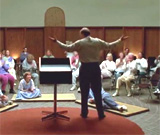
Group Lectures, Mantra Repetitions,
and Singing
|
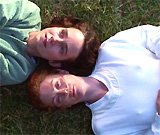
Self-Help Exercises and Therapy (Carol with Joyce (Jessica Harper))
|
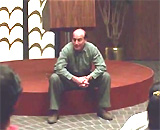
Peter: "I transform that negative stimulus..."
|
- Peter also lectured the inhabitants with more suggested
rules about life - no newspapers, no TV news, and avoidance of
the "media doom and gloom"; he spouted and emphasized his main message
- the need to take individual responsibility for one's problems
("I transform that negative stimulus into something that will not
do harm to me")
- the film's ambiguous final image (with a soft hum in the background) was of the vulnerable,
introspective, self-effacing, and completely-isolated Carol attempting
to find elusive liberation through self-love, advised by Claire;
she addressed her mirror image with "I love you... I really love you... I love you..." -
the film's final words of dialogue before an abrupt cut to black)
as the sole occupant of the dark igloo - a colorless and drab environment
reminiscent of a bomb shelter; her retreat into isolation ultimately
was no better than in her home in Los Angeles
|
Devastating Downbeat Ending
|
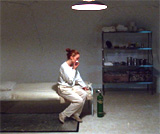
With Oxygen Tank In Her Reclusive "Igloo"
|
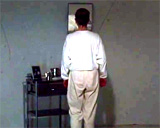
Before Her Mirror
|
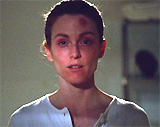
"I love you...I really love you..."
|
|
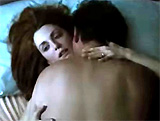
Unfulfilling Sex with Husband Greg
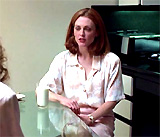
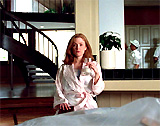
Carol White (Julianne Moore) - Soft-Spoken, a Milkaholic
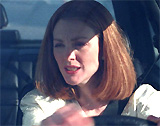
Carol Choking on Truck Exhaust
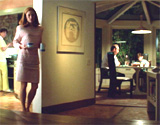
Isolated, Suburban Married Life
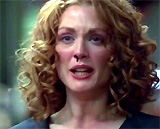
Carol's Unexpected Nosebleed at Hair Salon
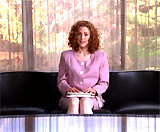
In A Psychiatrist's Office
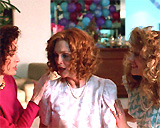
Carol's Breathing Attack at Baby Shower

Carol's Viewing of an Infomercial Video: Environmental Disease
Video
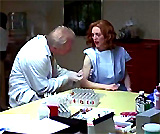
Allergen Testing with Specialist Dr. Reynolds
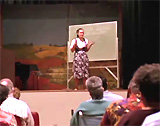
Lecture-Seminar on Creating Safe, Toxic-Free Spaces
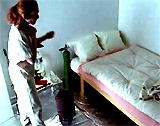
Carol's Safe Space in Her Home
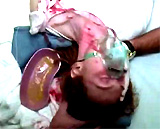
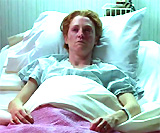
After Collapse in Dry Cleaners Store - Taken Away in Ambulance
to Hospital
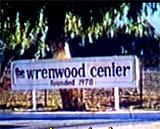
Wrenwood Center - Video Commercial For a Safe Haven
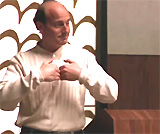
Wrenwood Self-Help Guru-Leader Peter Dunning
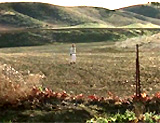
Lester - Patient Always Seen at a Distance
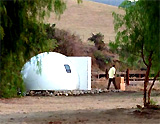
Carol's Sterile White Igloo "Safe House"
|



















